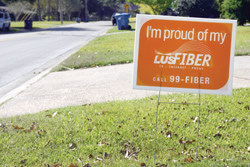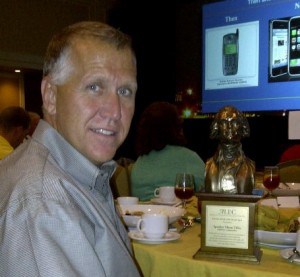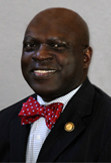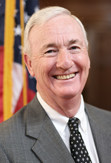
Phillip “It worked for Qwest so why not community broadband” Dampier
While doing research on another story, I recently uncovered a fascinating legal case that set an important precedent on whether it is right for a community to hold a referendum before authorizing a new telecommunications provider to offer service in a community.
Opponents of community-owned broadband networks routinely claim such services are “undemocratic” because they can exist without the majority support of the community they propose to serve. In 2001, Qwest (now CenturyLink) ran into just such a “majority-rules” provision in Boulder, Colo. that companies like AT&T and Time Warner Cable advocate should be a law everywhere.
A provision in Boulder’s Charter required that voters in a municipal election approve any cable franchise before it was granted by the city. Wishing to avoid the cost of such an election, Qwest sued the City of Boulder and asked for summary judgment to declare the policy unlawful. Chief Judge Lewis Babcock found Qwest’s argument compelling enough to invalidate the city’s mandatory referendum provision.
Qwest argues that the language in [U.S. Federal Law] 47 U.S.C. § 541 regulating franchising authorities is in direct conflict with [Boulder’s] § 108’s mandatory election provision. I agree.
First, the Act provides guidance to, and restrictions on, “franchising authorities.” Section 541’s requirements are directed toward franchising authorities. See 47 U.S.C. § 541(a)(1), (3), (4). Under the statute, a “franchise” is “an initial authorization, or renewal thereof,” issued by a franchising authority to construct or operate a cable system. 47 U.S.C. § 522(9). A “`franchising authority’ means any governmental entity empowered by Federal, State, or local law to grant a franchise.” 47 U.S.C. § 522(10) (emphasis added).
Here, Qwest approached City officials to seek franchise approval. The City granted a revocable permit to Qwest, and agreed to “grant a cable television franchise authorizing [Qwest] to provide cable television service within the City for a term of years” once an affirmative vote by the qualified taxpaying voters occurred. There is no evidence that the City negotiated the franchise in any manner, or put any additional restrictions or caveats on the franchise beyond voter approval. City officials follow the will of the voters with no additional scrutiny or decision-making. Thus, the City has abdicated franchising authority to the City’s voting citizens. These voters cannot, by the plain terms of the statute, be a “governmental entity empowered by Federal, State, or local law to grant a franchise.” 47 U.S.C. § 522(10). Therefore, direct conflict between the federal and local laws exist, as it is impossible for the franchise to be granted by a governmental entity as required by the Act, and simultaneously granted by the voters as required in § 108.
Second, § 541 imposes numerous and specific requirements on franchising authorities. The statute forbids exclusive franchises, see § 541(a)(1); unreasonable refusals to award additional competitive franchises, see id. at (a)(1); requirements that have the purpose or effect of prohibiting, limiting, restricting, or conditioning the provision of a telecommunications service by a cable operator, see id. at (b)(3)(B); ordering a cable operator or affiliate thereof to discontinue the provision of a telecommunications service, discontinuing the operation of a cable system by reason of the failure of a cable operator to obtain a franchise or franchise renewal, see id. at (b)(3)(C)(i)-(ii); or requiring a cable operator to provide any telecommunications service or facilities as a condition of the initial grant of a franchise. See Id. at (b)(3)(D).
A franchising authority has affirmative requirements as well. It must assure that access to cable service is not denied to any group of potential residential cable subscribers because of the income of the residents of the local area in which such group resides, see id. at (a)(3); and allow the applicant’s cable system a reasonable period of time to become capable of providing cable service to all households in the franchise area, see id. at (a)(4)(A).
However, by allowing voters unfettered and unreviewed discretion to grant or reject a franchise, § 108 is in conflict with virtually every provision in § 541. Because only WOWC has received a franchise, voters could effectively grant WOWC an exclusive franchise simply by refusing to vote affirmatively for a second operator. See id. at (a)(1). Voters could unreasonably refuse to award an additional competitive franchise, as they could deny a franchise for any reason or for no reason. See id. Qwest correctly argues that § 108 “provides voters with the unfettered and unreviewable discretion either to grant or deny a cable television franchise for any reason, or for no reason at all.”
 In brief, the judge found cable franchises are granted or denied at the municipal level by local government, not through referendums. The City of Boulder was effectively abdicating its responsibility under federal law to manage the franchising process itself. There is no provision in federal law that allows citizens to directly vote a cable franchise agreement up or down, although voters can use the ballot box to remove local officials who do not represent the will of the majority.
In brief, the judge found cable franchises are granted or denied at the municipal level by local government, not through referendums. The City of Boulder was effectively abdicating its responsibility under federal law to manage the franchising process itself. There is no provision in federal law that allows citizens to directly vote a cable franchise agreement up or down, although voters can use the ballot box to remove local officials who do not represent the will of the majority.
More importantly, the judge recognized that turning the process over to local citizenry could unintentionally hand an incumbent provider a monopoly just by voting down any would-be competitor. Why would local citizens oppose competition? As we’ve seen in the fight for community broadband, incumbent providers will spend millions to keep would-be competitors out with a variety of scare tactics and propaganda. Providers have suggested community networks are guaranteed financial failures, will result in yards being torn up to install service, might result in local job losses, and will raise taxes whether residents want the service or not.
Judge Babcock also found that laws that could limit effective competition to incumbent cable companies are in direct conflict with the 1992 federal Cable Act:
The legislative history clearly supports the proposition that Congress was focused on fostering competition when passing the 1992 Act. The Senate Report regarding the Act states, “[I]t is clear that there are benefits from competition between two cable systems. Thus, the Committee believes that local franchising authorities should be encouraged to award second franchises.”
[…] Given the clear intent of Congress to employ § 541 as a vehicle for promoting vigorous competition, I conclude that § 108 is in conflict. Section 108 serves only to provide a significant hindrance to the competition that Congress clearly intended to foster. It forces the potential franchiser to spend money, time, advertising, and logistical support on an election. Thus, § 108 “stands as an obstacle to the accomplishment and execution of the full purposes and objectives of Congress.”
Perhaps the time has come to raise similar challenges in states where legislatures have passed community broadband bans or placed various impediments on providing service. If Qwest can successfully argue that such rules are designed to limit competition, local communities can certainly argue the panoply of anti-competition laws that were written by and for incumbent cable and phone companies deserve the same scrutiny.
Referendums are an inappropriate way to approve the entry of new competitors.



 Subscribe
Subscribe


 In brief, the judge found cable franchises are granted or denied at the municipal level by local government, not through referendums. The City of Boulder was effectively abdicating its responsibility under federal law to manage the franchising process itself. There is no provision in federal law that allows citizens to directly vote a cable franchise agreement up or down, although voters can use the ballot box to remove local officials who do not represent the will of the majority.
In brief, the judge found cable franchises are granted or denied at the municipal level by local government, not through referendums. The City of Boulder was effectively abdicating its responsibility under federal law to manage the franchising process itself. There is no provision in federal law that allows citizens to directly vote a cable franchise agreement up or down, although voters can use the ballot box to remove local officials who do not represent the will of the majority.




 Alex Atwood (R – Brunswick) District 179
Alex Atwood (R – Brunswick) District 179


